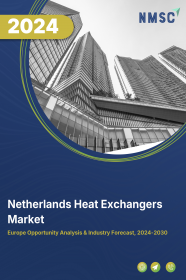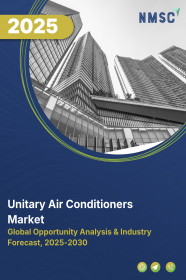
Netherlands Heat Exchangers Market by Type (Shell & Tube, Plate & Frame, Air Cooled, and Others), by Material (Metals, Alloys, and Brazing-CLAD), and by End User (Chemical, Energy & Power, Heating, Ventilation, Air Conditioning, and Refrigeration (HVACR), Food & Beverage, Pulp & Paper, and Others)– Opportunity Analysis and Industry Forecast, 2024–2030
Industry: Retail and Consumer | Publish Date: 03-Dec-2024 | No of Pages: 118 | No. of Tables: 86 | No. of Figures: 51 | Format: PDF | Report Code : RC1546
Market Overview
The Netherlands Heat Exchangers Market size was valued at USD 167.3 million in 2023, and is predicted to reach USD 281.6 million by 2030, with a CAGR of 7.1% from 2024 to 2030.
Heat exchangers are devices designed to transfer heat from one fluid to another without direct fluid contact, extensively utilized across industrial, commercial, and residential sectors, including HVAC systems and refrigeration units, to efficiently heat or cool fluids or air. Functioning by allowing heat to pass through a barrier, such as a solid wall or a series of plates or tubes, they can be employed for tasks such as heating water in a boiler or cooling air in an air conditioning system. Available in various designs tailored to specific needs, ranging from simple radiator coils to complex systems found in chemical processing plants and power generation facilities, they play a crucial role in multiple industries and applications.
They regulate air temperature in buildings, facilitate steam production in power plants, control temperatures during chemical reactions, and aid in food processing, among other uses. Additionally, they serve as essential components in automotive cooling systems and have widespread applications in aerospace, marine, and wastewater treatment industries, contributing significantly to efficient thermal management and energy transfer.
Growing Industrialization and Urbanization Drive Netherlands Market Growth
Growing industrialization and urbanization across the globe are key drivers of market growth in the Netherlands. As industries expand and urban areas continue to develop, the demand for various products and services, including heat exchangers, increases. Heat exchangers play a crucial role in industrial processes, commercial buildings, and residential infrastructure by efficiently transferring heat between fluids.
With the growing need for heating, ventilation, and air conditioning (HVAC) systems in industrial and residential settings, the demand for heat exchangers is expected to rise. Moreover, as urbanization accelerates, there is a greater emphasis on energy efficiency and sustainability, further driving the adoption of heat exchangers to optimize energy usage and reduce environmental impact. Therefore, the combination of industrialization and urbanization trends worldwide contributes to the growth of the heat exchangers market in the Netherlands.
Increasing Demand for HVAC Systems Propels Netherlands Market Growth
The increasing demand for HVAC systems propels market growth in the Netherlands. As urbanization and infrastructure development continue to accelerate, there is a rising need for heating, ventilation, and air conditioning (HVAC) systems in both residential and commercial buildings. HVAC systems rely heavily on heat exchangers to efficiently transfer heat between fluids, making them indispensable components.
With a growing emphasis on energy efficiency and environmental sustainability, the demand for high-performance HVAC systems equipped with advanced heat exchangers is on the rise. Consequently, this increasing demand for HVAC systems drives market growth in the Netherlands as consumers and businesses prioritize indoor comfort and energy-efficient solutions.
Competition from Alternative Technologies Restrains Market Growth
Competition from alternative technologies poses a restraint on market growth in the Netherlands. While heat exchangers offer efficient heat transfer solutions, alternative technologies such as heat pumps, direct cooling methods, and thermal storage systems are gaining traction.
These alternatives often tout advantages such as lower energy consumption, smaller footprints, and simpler installations. Moreover, advancements in materials science and manufacturing techniques enable the development of innovative heat transfer solutions that may outperform traditional heat exchangers in certain applications. To remain competitive, heat exchangers manufacturers in the Netherlands must focus on innovation, cost reduction, and customization to meet evolving customer needs and differentiate their products in the market.
Integration with Renewable Energy Systems Creates a Market Opportunity
Integration with renewable energy systems presents a significant market opportunity. As the world shifts towards sustainable energy sources, there's a growing demand for heat exchangers that can work seamlessly with renewable energy technologies such as solar panels, wind turbines, and geothermal systems. Heat exchangers play a crucial role in harnessing and distributing heat generated from renewable sources efficiently.
By integrating with renewable energy systems, heat exchangers can enhance overall energy efficiency, reduce environmental impact, and contribute to the transition towards a greener future. This presents a promising market opportunity for heat exchangers manufacturers to innovate and develop products that cater to the growing demand for renewable energy solutions.
Competitive Landscape
Several market players operating in the Netherlands’s heat exchangers market include Alfa Laval AB, Johnson Controls International plc, Carrier Global Corporation, Lennox International Inc., Trane Technologies plc, API Heat Transfer Inc., Kelvion Holding GmbH, Xylem Inc., Danfoss Group, and General Electric Company among others. These companies are adopting various strategies such as product launches to remain dominant in the heat exchangers market.
Key Market Segments
By Type
-
Shell & Tube
-
Fixed Tube Heat Exchangers
-
U-Tube Heat Exchangers
-
Floating Head Heat Exchangers
-
Other Shell & Tube Heat Exchangers
-
-
Plate & Frame Heat Exchangers
-
Gasketed Plate & Frame Heat Exchangers
-
Welded Plate & Frame Heat Exchangers
-
Brazed Plate & Frame Heat Exchangers
-
Other Plate & Frame Heat Exchangers
-
-
Air Cooled
-
Forced Draft Heat Exchangers
-
Induced Draft Heat Exchangers
-
-
Others
By Materials
-
Metals
-
Alloys
-
Brazing-CLAD
By End User
-
Chemical
-
Energy & Power
-
HVACR
-
Food & Beverage
-
Pulp & Paper
-
Others
Key Players
-
Alfa Laval AB
-
Johnson Controls International plc
-
Carrier Global Corporation
-
Lennox International Inc.
-
Trane Technologies plc
-
API Heat Transfer Inc.
-
Kelvion Holding GmbH
-
Xylem Inc.
-
Danfoss Group
-
General Electric Company
REPORT SCOPE AND SEGMENTATION:
|
Parameters |
Details |
|
Market Size in 2023 |
USD 167.3 Million |
|
Revenue Forecast in 2030 |
USD 281.6 Million |
|
Growth Rate |
CAGR of 7.1% from 2024 to 2030 |
|
Analysis Period |
2023–2030 |
|
Base Year Considered |
2023 |
|
Forecast Period |
2024–2030 |
|
Market Size Estimation |
Million (USD) |
|
Growth Factors |
|
|
Companies Profiled |
10 |
|
Market Share |
Available for 10 companies |
|
Customization Scope |
Free customization (equivalent up to 80 working hours of analysts) after purchase. Addition or alteration to country, regional, and segment scope. |
|
Pricing and Purchase Options |
Avail customized purchase options to meet your exact research needs. |

















 Speak to Our Analyst
Speak to Our Analyst





















